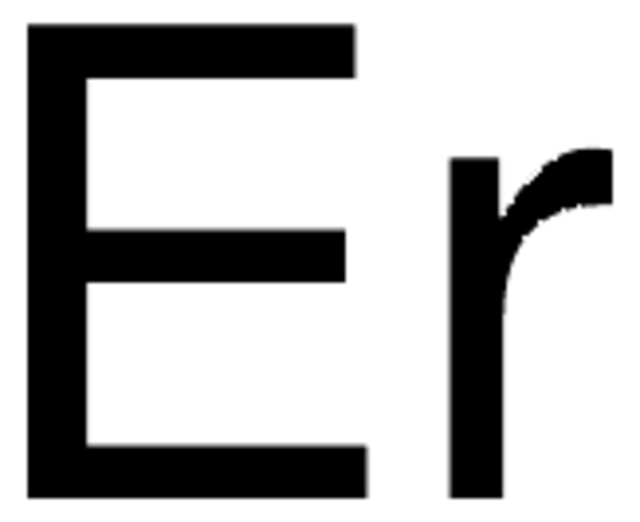GF18382248
Erbium
rod, 50mm, diameter 2.0mm, cast, 99%
Synonym(s):
Erbium, ER007905
Sign Into View Organizational & Contract Pricing
All Photos(2)
About This Item
Empirical Formula (Hill Notation):
Er
CAS Number:
Molecular Weight:
167.26
MDL number:
UNSPSC Code:
12141603
PubChem Substance ID:
NACRES:
NA.23
Recommended Products
Assay
99%
form
rod
manufacturer/tradename
Goodfellow 183-822-48
resistivity
86 μΩ-cm, 20°C
L × diam.
50 mm × 2.0 mm
bp
2868 °C (lit.)
mp
1529 °C (lit.)
density
9.062 g/mL at 25 °C (lit.)
SMILES string
[Er]
InChI
1S/Er
InChI key
UYAHIZSMUZPPFV-UHFFFAOYSA-N
Looking for similar products? Visit Product Comparison Guide
General description
For updated SDS information please visit www.goodfellow.com.
Legal Information
Product of Goodfellow
Storage Class Code
13 - Non Combustible Solids
WGK
WGK 3
Flash Point(F)
Not applicable
Flash Point(C)
Not applicable
Choose from one of the most recent versions:
Certificates of Analysis (COA)
Lot/Batch Number
Sorry, we don't have COAs for this product available online at this time.
If you need assistance, please contact Customer Support.
Already Own This Product?
Find documentation for the products that you have recently purchased in the Document Library.
D Fleming
Journal of cutaneous laser therapy, 1(1), 15-21 (2001-05-22)
Carbon dioxide laser resurfacing has been a valuable procedure for facial skin rejuvenation since the early 1990s, largely replacing medium and deep chemical peels and dermabrasion. The introduction of the erbium:YAG laser for resurfacing has caused confusion about its role.
G N Marcells et al.
The Journal of otolaryngology, 29(2), 78-82 (2000-05-20)
There are two lasers for resurfacing. The erbium:YAG laser and the CO2 laser both have different physical and physiologic differences when striking the skin. Therefore, each laser gives a different result. This article reviews the use of the Sharplan Silktouch
R Kaufmann
Clinical and experimental dermatology, 26(7), 631-636 (2001-11-07)
Laser resurfacing procedures in actinic skin damage and the treatment of disorders associated with skin ageing are becoming more popular. For both purposes Erbium:YAG laser-technology enables us to perform a highly precise skin ablative work, which can be most helpful
D M Clarkson
Dental update, 28(6), 298-302 (2001-08-31)
This article reviews aspects of the probable mechanisms used by erbium dental lasers for cutting dentine and enamel, describes key issues of the risk of temperature elevation and speed of cutting relative to conventional techniques and looks at issues concerned
Isao Ishikawa et al.
Journal of periodontal research, 39(4), 275-285 (2004-06-23)
Since lasers were introduced for the treatment of oral diseases, there has been considerable advancement in technology. As a result, numerous laser systems are currently available for oral use. Neodymium:Yttrium-Aluminum:Garnet (Nd:YAG), carbon dioxide (CO(2)) laser and the semiconductor Diode lasers
Our team of scientists has experience in all areas of research including Life Science, Material Science, Chemical Synthesis, Chromatography, Analytical and many others.
Contact Technical Service

